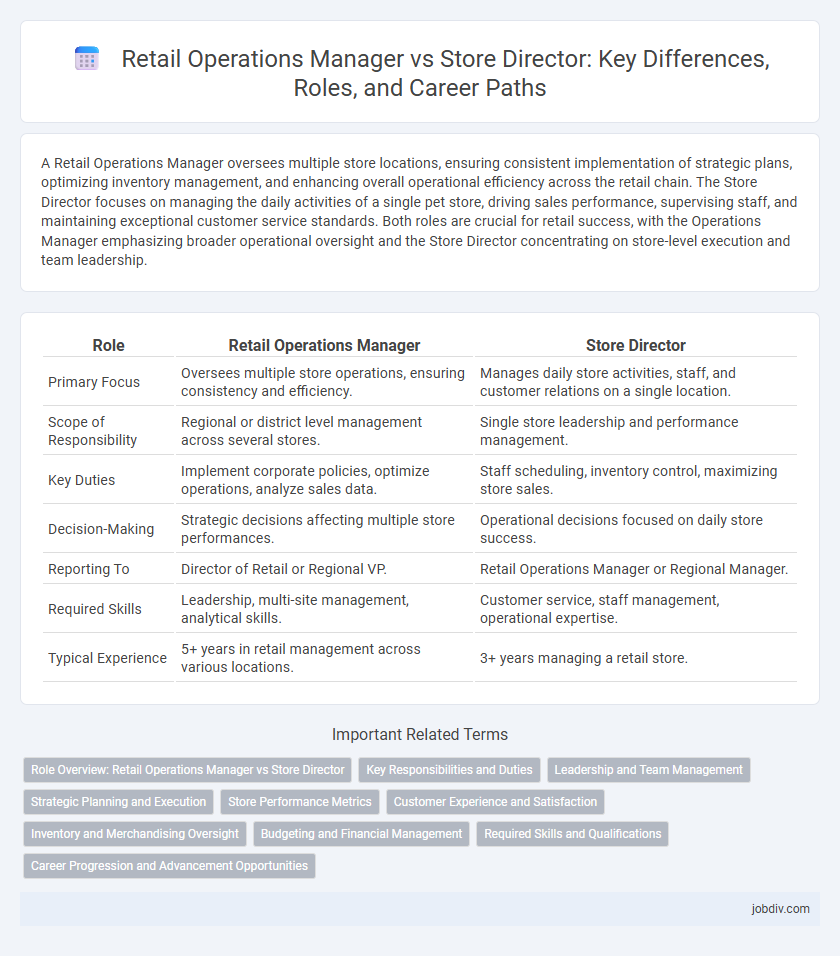A Retail Operations Manager oversees multiple store locations, ensuring consistent implementation of strategic plans, optimizing inventory management, and enhancing overall operational efficiency across the retail chain. The Store Director focuses on managing the daily activities of a single pet store, driving sales performance, supervising staff, and maintaining exceptional customer service standards. Both roles are crucial for retail success, with the Operations Manager emphasizing broader operational oversight and the Store Director concentrating on store-level execution and team leadership.
Table of Comparison
| Role | Retail Operations Manager | Store Director |
|---|---|---|
| Primary Focus | Oversees multiple store operations, ensuring consistency and efficiency. | Manages daily store activities, staff, and customer relations on a single location. |
| Scope of Responsibility | Regional or district level management across several stores. | Single store leadership and performance management. |
| Key Duties | Implement corporate policies, optimize operations, analyze sales data. | Staff scheduling, inventory control, maximizing store sales. |
| Decision-Making | Strategic decisions affecting multiple store performances. | Operational decisions focused on daily store success. |
| Reporting To | Director of Retail or Regional VP. | Retail Operations Manager or Regional Manager. |
| Required Skills | Leadership, multi-site management, analytical skills. | Customer service, staff management, operational expertise. |
| Typical Experience | 5+ years in retail management across various locations. | 3+ years managing a retail store. |
Role Overview: Retail Operations Manager vs Store Director
Retail Operations Managers oversee multiple store locations, focusing on optimizing operational efficiency, implementing company policies, and managing regional budgets to drive overall profitability. Store Directors are responsible for the day-to-day management of a single store, including staff supervision, inventory control, and ensuring exceptional customer service to meet sales targets. While the Retail Operations Manager emphasizes strategic coordination across stores, the Store Director concentrates on in-store execution and team leadership.
Key Responsibilities and Duties
Retail Operations Managers oversee multiple store locations, focusing on operational efficiency, supply chain management, and overall business strategy alignment. Store Directors manage day-to-day store activities, emphasizing staff supervision, customer experience, and sales performance within a single store. Both roles require leadership skills, but Operations Managers handle broader logistical coordination while Store Directors concentrate on in-store execution and team motivation.
Leadership and Team Management
A Retail Operations Manager oversees multiple store locations, focusing on strategic leadership, operational consistency, and performance metrics to optimize overall business results. A Store Director leads a single store, emphasizing hands-on team management, customer experience, and daily sales performance to drive local success. Both roles require strong leadership skills, but the Operations Manager's scope centers on broad operational oversight, while the Store Director concentrates on direct team engagement and in-store execution.
Strategic Planning and Execution
Retail Operations Managers focus on optimizing store processes and ensuring operational efficiency through targeted strategic planning and execution. Store Directors drive overall store performance by aligning team leadership with customer experience goals and executing higher-level business strategies. Both roles require data-driven decision-making but differ in scope, with Operations Managers emphasizing operational tactics and Store Directors prioritizing comprehensive business leadership.
Store Performance Metrics
Retail Operations Managers analyze sales growth, inventory turnover, and customer satisfaction scores to optimize multiple store locations, ensuring consistent performance across regions. Store Directors focus on daily store metrics such as conversion rates, average transaction value, and employee productivity to drive target achievement and enhance in-store customer experience. Both roles leverage performance data but differ in scope, with Retail Operations Managers overseeing broader operational efficiency and Store Directors managing tactical store-level execution.
Customer Experience and Satisfaction
Retail Operations Managers focus on optimizing store processes and team performance to enhance overall customer experience and satisfaction by ensuring consistent service quality and efficient operations. Store Directors hold responsibility for both customer engagement and the strategic leadership of the store, directly influencing customer loyalty through personalized service and team motivation. Both roles aim to elevate customer satisfaction, but Store Directors typically have more direct interaction with customers, shaping the store atmosphere and driving community relationships.
Inventory and Merchandising Oversight
Retail Operations Managers oversee inventory accuracy and merchandising strategies across multiple locations, ensuring consistent stock levels and brand presentation. Store Directors manage day-to-day inventory control and merchandising execution within a single store, driving sales through localized product placement and stock replenishment. Effective collaboration between these roles optimizes stock turnover and enhances customer experience in retail environments.
Budgeting and Financial Management
Retail Operations Managers oversee budgeting processes, allocating financial resources across multiple store locations to maximize operational efficiency and profitability. Store Directors handle day-to-day financial management within a single store, including expense control, sales tracking, and local budget adherence. Both roles require strong financial acumen, but Operations Managers focus on strategic budget planning while Store Directors emphasize tactical execution and cost management.
Required Skills and Qualifications
A Retail Operations Manager requires strong skills in inventory control, data analysis, and team leadership, often with a background in logistics or business administration. Store Directors need expertise in customer service excellence, staff development, and sales strategy, typically supported by experience in retail management and a deep understanding of market trends. Both roles demand proficiency in budgeting, performance metrics, and compliance with retail policies to drive store profitability and operational efficiency.
Career Progression and Advancement Opportunities
A Retail Operations Manager typically oversees multiple store locations, focusing on sales strategies, inventory control, and operational efficiency, which lays a foundation for advancing to corporate roles such as Regional Manager or Director of Operations. In contrast, a Store Director manages a single store's day-to-day activities, employee performance, and customer experience, positioning themselves for growth into district or area management roles. Career progression for both roles values leadership skills, operational expertise, and the ability to drive profitability across various retail settings.
Retail Operations Manager vs Store Director Infographic

 jobdiv.com
jobdiv.com